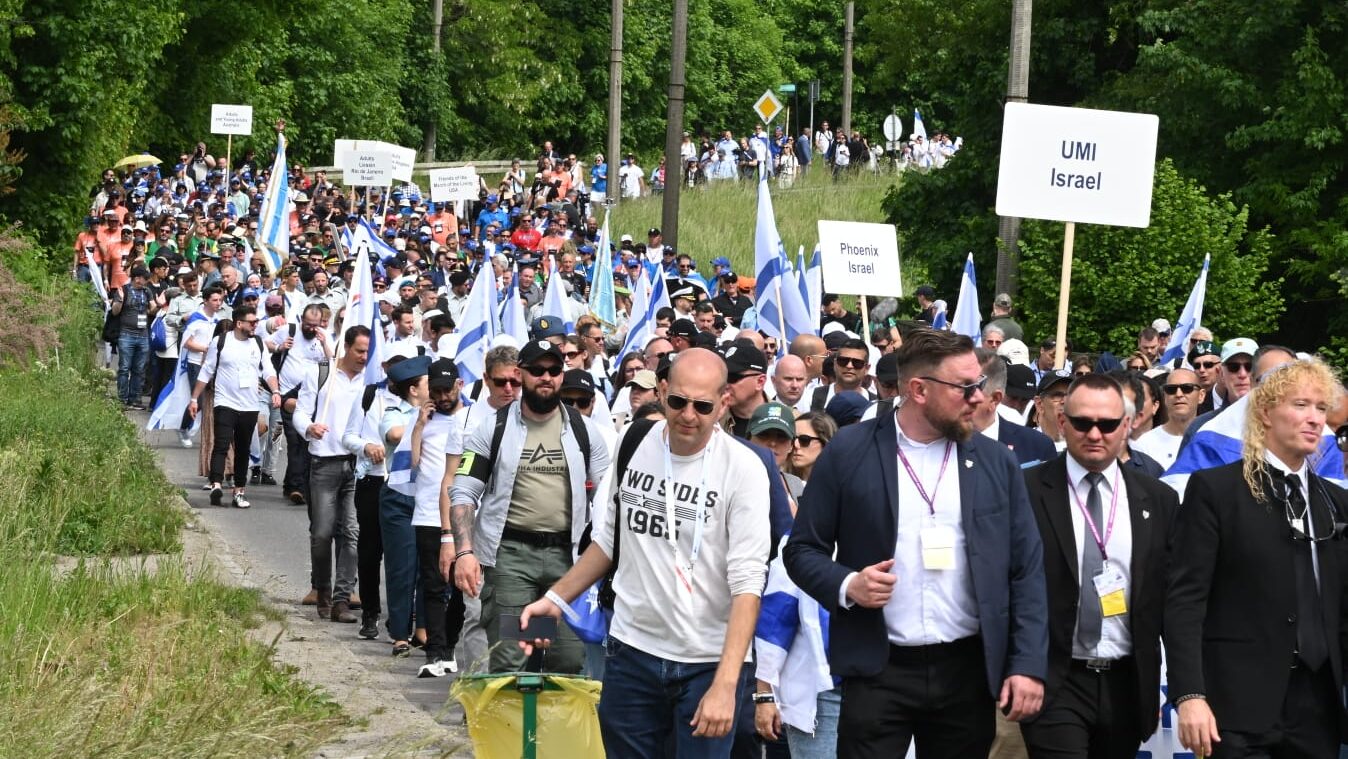Echoes of People Past and Present on the March of the Living
From Budapest to Auschwitz, survivors, students, and leaders unite to commemorate, reflect, and confront contemporary challenges
The March of the Living (the March) is an educational program that brings students from around the world to Poland to learn about and remember the Holocaust. The annual program includes a march from Auschwitz to Birkenau on Holocaust Memorial Day. Over 300,000 people have participated in the program since its inception in 1988. This year, around 8,000 people, including 55 Holocaust survivors, participated in the event, which started in Hungary before continuing to Poland.
The March commenced at Budapest’s historic Dohány Street Synagogue, adjacent to the birthplace of Theodor Herzl, the visionary behind modern Zionism. Leading the procession were Hungarian Holocaust survivors, accompanied by thousands of supporters, commemorating the unfathomable tragedy that claimed the lives of over 6 million Jews.
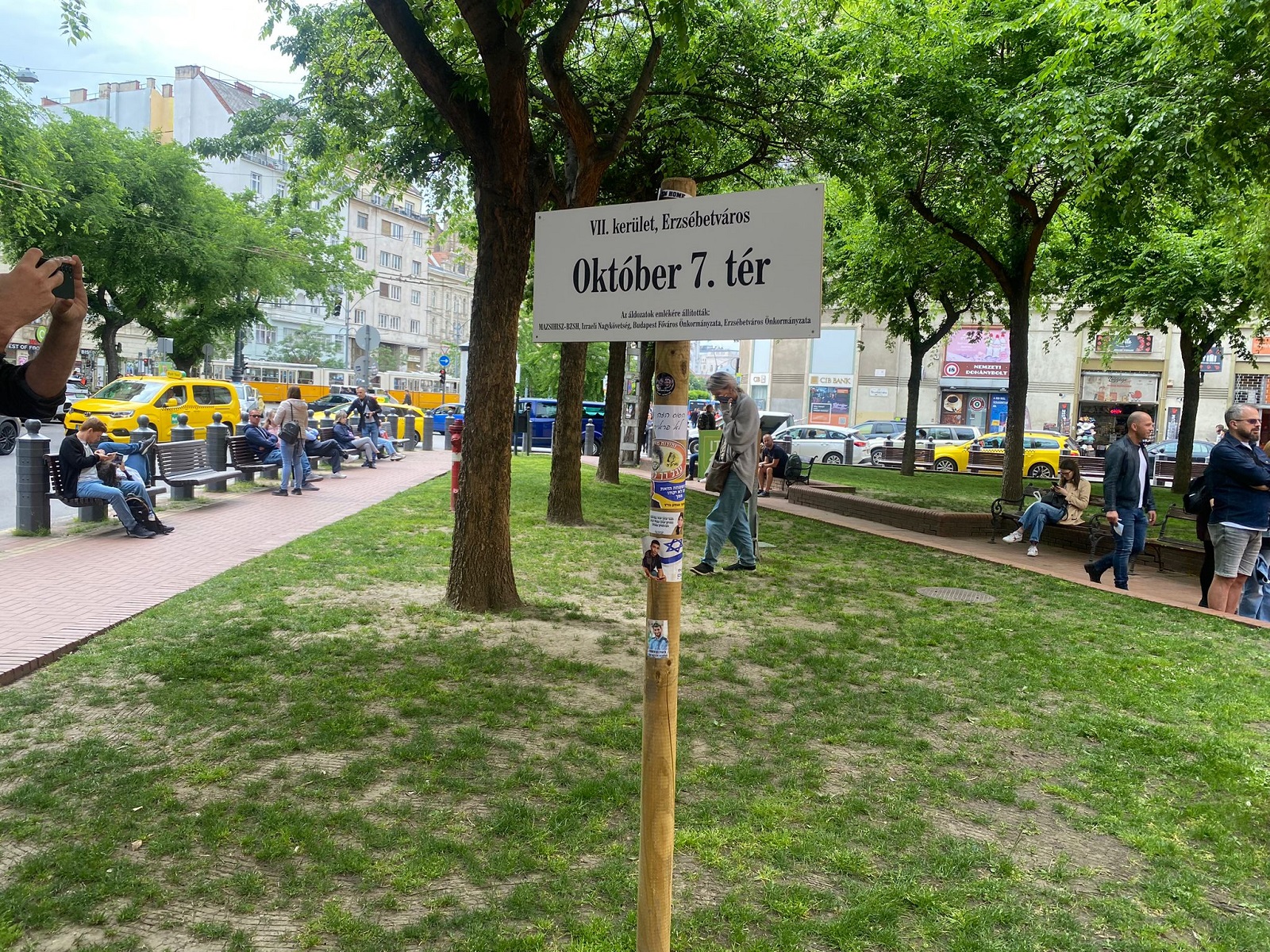
Herzl Square, next to the Dohány Street Synagogue in Budapest, Hungary, was temporarily renamed October 7 Square, in honor of the victims of the Hamas attack on southern Israel, May 3, 2024. (The Media Line)
While in Budapest, The Media Line had the opportunity to hear the testimony of Aviva Kinan, an octogenarian Holocaust survivor who tragically lost her biological father in the Nazi atrocities. Kinan resides in Tel Aviv and is a widow with two children and four grandchildren. The Media Line also spoke with Kinan’s daughter. From enduring pogroms and the Holocaust to grappling with the resurgence of antisemitism and anti-Israeli protests today, the Kinan family’s narrative reflects their continued, cross-generational struggle against intolerance and hatred.
“I am 80 years old, born in 1944 in Budapest, the first and only child to my parents. My father, a jewelry merchant in Hungary, managed to see me shortly after my birth, but a few days later, he was taken for forced labor in Budapest. When the Germans began retreating from Hungary, they marched him and thousands of other Jews on foot toward Germany in the ‘Death March.’ He did not survive,” said Kinan.
When Kinan was about six months old, she and her mother were forced to enter the ghetto in Budapest. Kinana said they stayed there for two and a half months until Budapest was liberated. Shortly thereafter, when Kinan was two and a half years old, her mother remarried.
“My mother’s husband adopted me, making me his legal daughter. Adoption was taboo at that time, and I never knew anything about my biological father. They did this to protect me from being ostracized, and I only discovered the secret when I was 24 years old after my adoptive father passed away,” Kinan explained.
She also revealed that her mother avoided discussing the horrors of the Holocaust, often trying to conceal the painful details.
Kinan’s late husband, a Holocaust survivor from Hungary, was just 13 years old when he found himself aboard the second train organized by Rudolf (Rezső) Israel Kasztner, a Hungarian Jew who smuggled Jews out of Poland and Slovakia via trains into Hungary and later into Switzerland in an effort to save them from the Nazis. Kinan’s late husband’s journey was abruptly halted near Vienna, where all passengers, including him and his mother, were forced into labor. This twist of fate spared them from the destiny awaiting many others at Auschwitz.
“I only began to talk about the Holocaust and deal with it after he passed away seven years ago. I felt that as the last survivor, I must continue to tell the story and ensure that it is not forgotten,” she shared.
Kinan said that even after what happened in Israel on October 7, she believes that it is now the safest place for Jews.
We need to convey and strengthen that the State of Israel exists
“We need to convey and strengthen that the State of Israel exists. After October 7, we suddenly felt like we were not protected enough, but I still believe that Israel provides better safety and security than any other place. Israel is our only home,” she said.
Kinan’s daughter, Anati Kinan, lives in Herzliya, Israel. She shared with The Media Line that she felt the presence of her family’s trauma strongly throughout her life.
“I remember when I was a little girl, my dad used to say that there was no God. He said if there were a God, he wouldn’t have allowed so many kids to be murdered in the Holocaust, in the war,” she recalled, adding, “October 7, it’s like the worst nightmare.”
After the Hamas attack, Anati said that she had been troubled for a week, thinking about moving to Europe.
“My father would probably cry in heaven if he knew about this. He ran away after the Holocaust in 1949. I know that he tried twice. He only felt safe in Israel, and here I am, thinking about taking my kids back to the place where 80% of his family was butchered,” she said.
Ultimately, Anati decided to stay in Israel despite all the concerns, as this is the only place she truly feels she belongs and is safe.
Being in Hungary, I am scared. I’m traveling a lot—to London and Frankfurt. You leave the train station, and you see the propaganda of ‘Free Hamas’ and the slogans ‘Free Palestine.’ You put the Israeli passport very deep in your bag. When people ask me to talk about myself, suddenly, I’m hiding.
“Being in Hungary, I am scared. I’m traveling a lot—to London and Frankfurt. You leave the train station, and you see the propaganda of ‘Free Hamas’ and the slogans ‘Free Palestine.’ You put the Israeli passport very deep in your bag. When people ask me to talk about myself, suddenly, I’m hiding,” she said.
This year’s March strongly emphasized October 7 and its aftermath, highlighting it as a continuing theme throughout the program and underlining the importance of Israel’s role in how Jews remember the Holocaust. The trauma and tragedy from the Hamas attack was incorporated into the trauma and tragedy of the Nazi genocide.
The March culminated in a ceremony at the Keleti Train Station in Budapest, marking the initial deportation of Hungarian Jews to Auschwitz-Birkenau. Following the ceremony, the “Train of the Living” embarked on its journey to Auschwitz, retracing the grim path of the original death transports from Hungary to Poland.
At Auschwitz, thousands gathered from around the world on Holocaust Remembrance Day to honor the millions of lives lost. The participants there listened to President Isaac Herzog convey by video message from his residence in Jerusalem his sorrow about the tragic events of October 7 and the disturbing resurgence of antisemitism. He extended unwavering support and solidarity to all March participants.
The March then continued to Birkenau’s solemn site and harrowing reminder of Nazi atrocities. Reflecting on the event’s significance, Rabbi Dr. Ari Berman, the president of Yeshiva University, met with a delegation of university presidents and expressed a deeply personal connection to the proceedings.
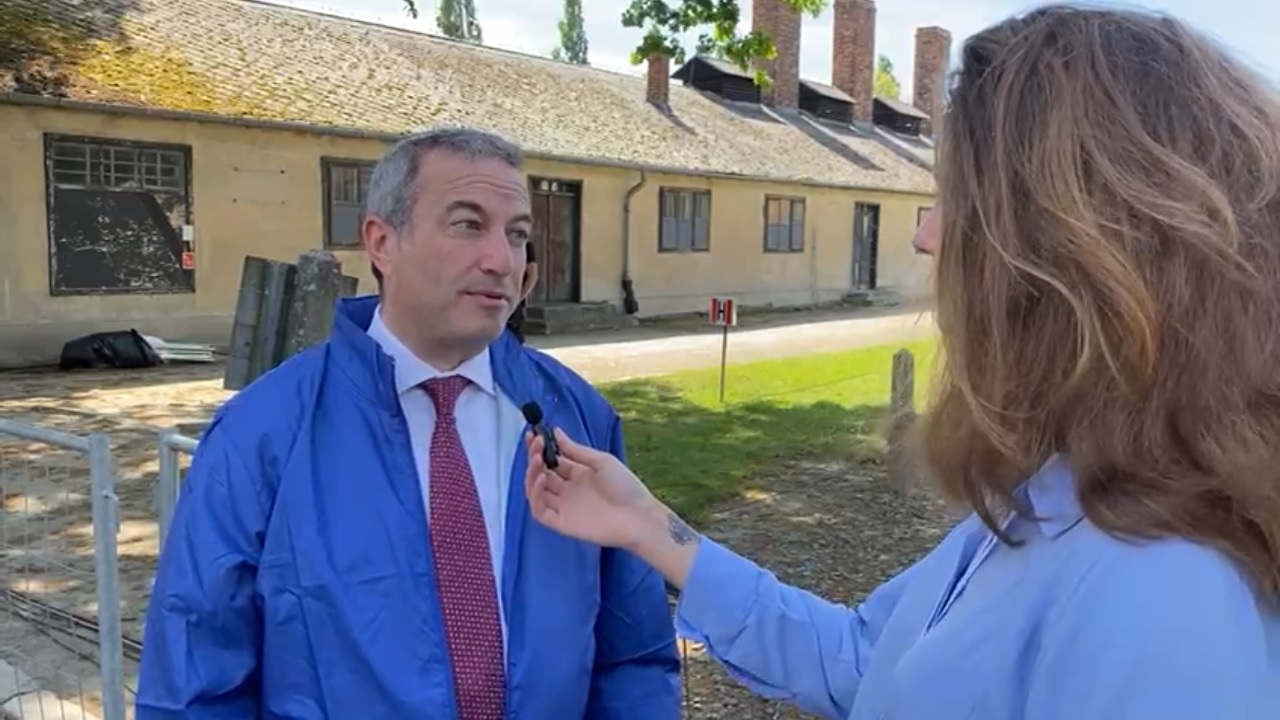
Rabbi Dr. Ari Berman, the president of Yeshiva University, speaks with The Media Line’s Veronica Neifakh at Auschwitz, in Poland, May 6. 2024. (Screenshot: The Media Line)
“The Nazis killed my grandparents’ families in the Poland-Ukraine area. So, just being here is viscerally painful and evokes so much emotion. On a broader scale, of course, in the wake of October 7, when the greatest travesty against the Jewish people happened since the Holocaust, the idea of remembering that unchecked hate leads to danger is a lesson that needs to be learned right now by everyone,” Rabbi Berman he told The Media Line.
Haim Taib, founder and president of the Menomadin Group and leader of the March’s October 7 delegation, shared with The Media Line his experience visiting Kibbutz Ein HaShlosha after October 7. There, he witnessed the burnt house of the Holocaust survivor Jacqueline Glicksman. During the Hamas attack on the kibbutz, Glicksman found herself alone in a shelter, unsure of what to do next.
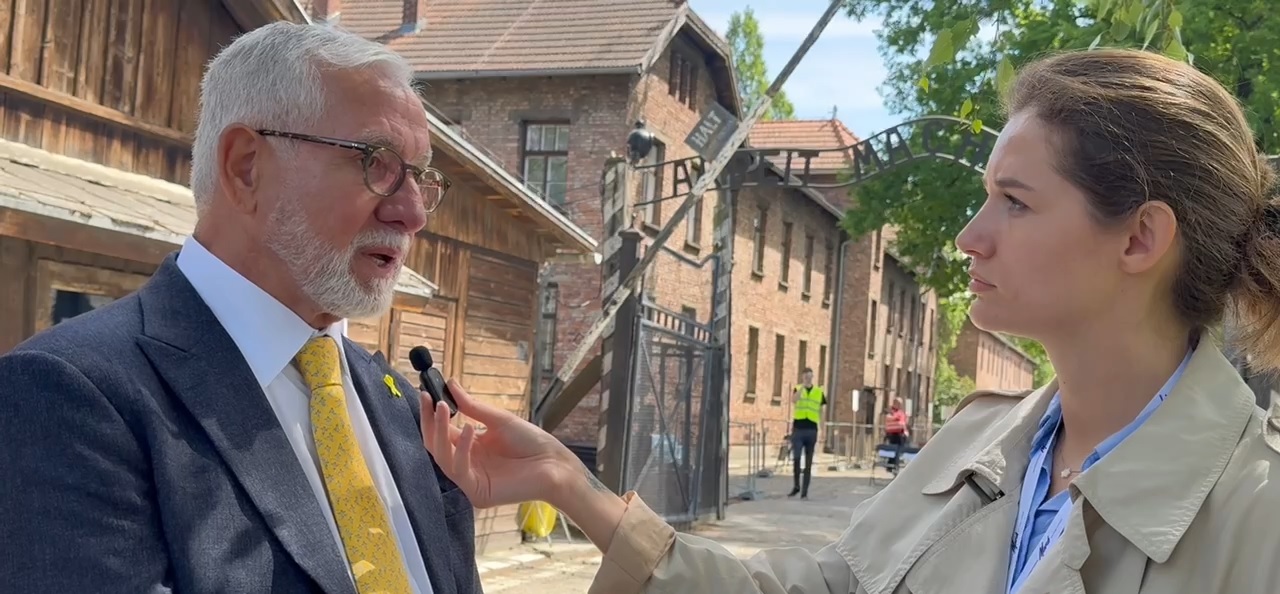
Haim Taib, founder and president of the Menomadin Group and leader of the March’s October 7 delegation, speaks with The Media Line’s Veronica Neifakh at Auschwitz, in Poland. (Screenshot: The Media Line)
“So, she jumped out of the window and ran away. She survived. My grandfather was also a Holocaust survivor from Tunisia. He was in the labor camps. He ran away after five months of working there and survived. So, all this brings me to think about the dedication they bring here for this mission,” he said.
Taib told The Media Line about the important message he wanted to pass on.
We are together. And we will survive, and we will continue to live in Israel.
“We can show the world that we are a very strong nation, the Jewish nation. We are together. And we will survive, and we will continue to live in Israel,” he said.
While the October 7 terror attack weighed heavily on the minds of March participants, it also sparked controversy among non-participants. During events at Auschwitz, a group of nine non-March activists staged an anti-Israel protest, drawing attention away from the program’s solemn proceedings. Approximately 10 Palestinian protesters joined in the protest, vehemently shouting at the participants, including Holocaust survivors.
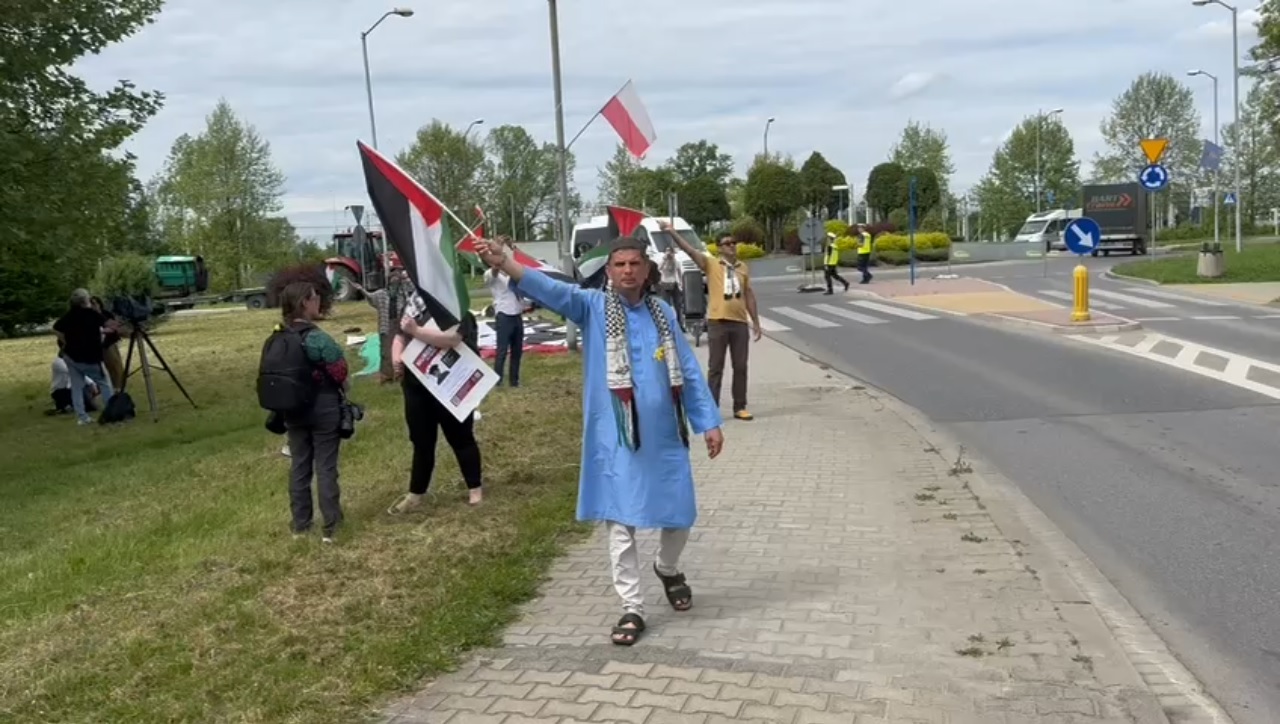
Pro-Palestinian demonstrators protest against Israel, shouting at March of the Living participants, including Holocaust survivors. (Screenshot: The Media Line)
Dr. David Machlis, associate professor at Adelphi University and March co-founder and vice chairman, discussed with The Media Line the lack of awareness among younger generations regarding the Holocaust, describing it as both alarming and saddening.
Twenty percent of the youth say the Holocaust is a myth
“Twenty percent of the youth say the Holocaust is a myth. I’m talking about 18- to 29-year-olds. Another 30% say it was a myth or it was exaggerated. Another 20% said they don’t know anything about it. Imagine those numbers. We have to make a difference,” he said.
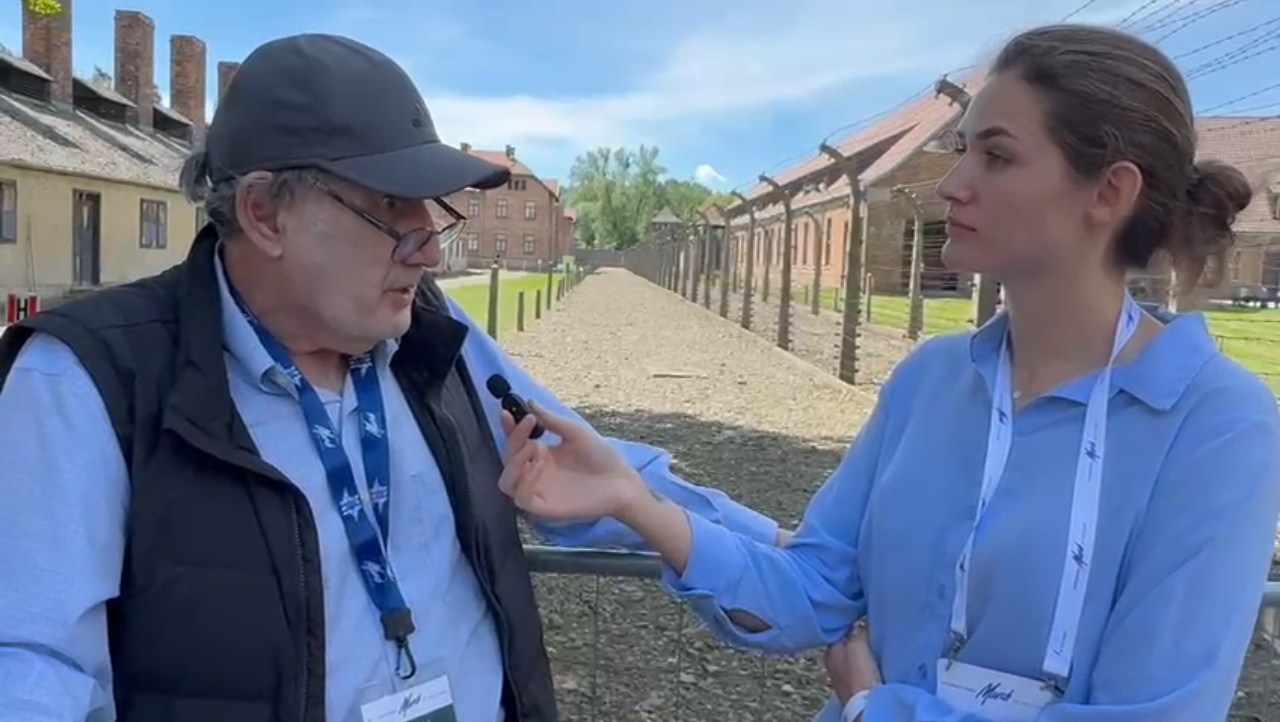
Dr. David Machlis, associate professor at Adelphi University and March co-founder and vice chairman, speaks with The Media Line’s Veronica Neifakh at Auschwitz, in Poland, May 6. 2024. (Screenshot: The Media Line)
Hundreds of Jewish students participated in the March this year, symbolizing the next generation’s commitment to remembrance and resistance against the resurgence of antisemitism and hatred in today’s world.
“Striking for Palestinian rights is right, but many people strike for Palestinian rights because they think that Jews shouldn’t exist, and I think this is similar to what we experienced long ago,” a student from Hungary, Kira, shared with The Media Line.
Jordan Erez, a student at Western University of Canada, shared with The Media Line the prevalence of anti-Israel protests on her campus that have disrupted classes and everyday activities. She said that protest participants are spreading hateful rhetoric about Jews and even resorting to vandalizing posters.
“It feels awful to have to go to a school and not be welcomed, and feel like you’re hated, and to be scared when you’re walking through the hallways, not to speak Hebrew, or to hide your Magan David under your shirt so that no one calls you out. It’s awful,” she added.
Ziv Zelinger, the Jewish Agency’s deputy director for the UK and Western Europe, conveyed to The Media Line the challenges that Jewish students face across Europe today.
“Since October 7, it’s been challenging for Jewish students across Europe because they feel like their very identity is being challenged. Students are being threatened and can’t go to class anymore. Whenever they go to campus, there are always these marches. A lot of antisemitic rhetoric, signs, and posters,” he explained.
Zelinger told The Media Line that the Jewish Agency works on college campuses and with young adults across Europe as a first line of support for them.
“We are trying to do as much as we can and to reach out to different communities, but as you know, it could be very lonely on our side,” he explained.
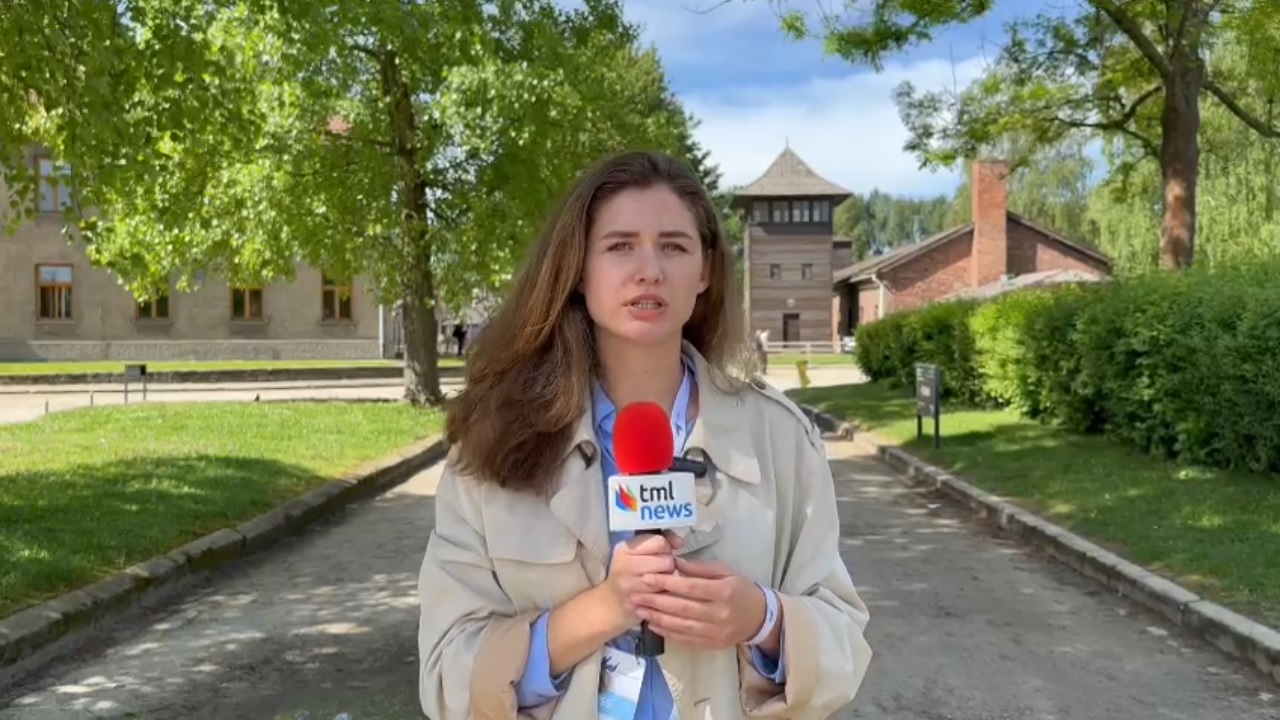
The Media Line’s Veronica Neifakh reports from Auschwitz, in Poland, May 6, 2024. (Screenshot: The Media Line)
Judith Tzamir, a Holocaust survivor originally from Germany who resettled in Israel in 1964, felt compelled by the tragic events of October 7 to undertake a pilgrimage she had long avoided. Joining 55 other survivors, she made the poignant journey to Auschwitz and participated in this year’s March, paying tribute to the memories of those lost. As the March was coming to an end, she shared her story with The Media Line.
After the Holocaust, in 1948, at the tender age of four and a half, Tzamir’s life took another turn. Her adoptive parents revealed her true origins while in a plaza in Berlin. It was then that she learned that her biological mother had concealed their Jewish identity during World War II by serving in the German army. Giving birth in 1943 in a hospital run by nuns, Tzamir’s mother decided to leave her behind to ensure her survival.
Tzamir’s resilience extends beyond surviving the Holocaust. During the harrowing October 7 Hamas attack, which her kibbutz, Kibbutz Mefalsim, experienced firsthand, members bravely defended against the assailants, showcasing unwavering courage in the face of adversity.
“Over the course of October 7, I felt that it’s important to go a bit more back to our Jewish roots and to identify ourselves with the victims, which we are for a second time. It’s important, first of all, to be together. Jews, not only from Israel, but from all over the world. Secondly, it’s important to remember for the whole world that there was something like the Holocaust, that it can happen again, and that we have a responsibility,” she shared with The Media Line.
